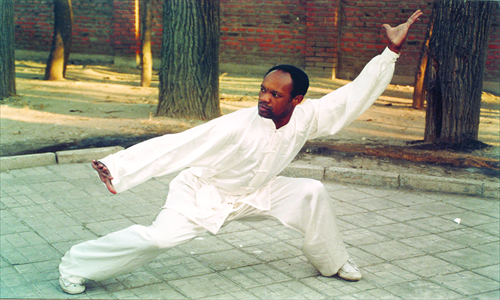Shaolin warrior shines

For a lethal martial artist commonly portrayed as a villain, kung fu grand master-turned-actor Luc Bendza has a disarming smile that belies his intimidating on-screen persona. Since coming to China more than 30 years ago, Bendza has built a reputation he modestly shrugs off as the "African Bruce Lee."
A member of the International Martial Arts Association, the 44-year-old from Gabon is a pioneer among African entertainers in China.
"Most [foreigners] who practice kung fu come and go. They learn it or take part in competitions, but no one has stayed for years like me," he explains. "Most expat roles in TV and movies go to Caucasians. There are few black roles, which is a shame."
Married to a Chinese wife with a young son, Bendza has starred in dozens of films and TV drama series alongside superstars such as Jackie Chan. Showing some of his work to Metropolitan on a portable DVD player over coffee, his pride in his craft - and roles - is obvious.
"This is The Legend of Bruce Lee," he says in polished Putonghua, referring to a 50-episode series aired on China Central Television based on the namesake Hong Kong martial arts icon. "I play Jesse Glover, an American student of Lee's who later becomes his first disciple. Through this series, I learned my childhood idol was not only a kung fu master but also a warm, helpful person."
He says he learned Chinese because he wanted to know the culture behind the superficial martial arts gestures.
"When I came to China, I was a teenage filled with love for martial arts who had a simple wish to learn it well. When you need to learn martial arts on a deeper level, you have to learn the language, the technical terms and the culture surrounding it," he says.
Typecast as the villain
Bendza's martial arts prowess and African heritage ensure he regularly attracts attention from wuxia filmmakers, even if he is often cast as a villain.
"Maybe some directors think African actors are suited to certain roles, but I don't mind. When Jackie Chan and other Chinese film stars made their break in Hollywood, they also played bad guys," he says.
Bendza found the showbiz spotlight when he was scouted 20 years ago by a film director at a martial arts competition in Zhengzhou, Henan Province.
"I was crowned champion at that competition, and the director saw potential in me as an actor. I was recommended to his other friends in the industry, so I started to get roles in movies and TV series," he recalls, adding nowadays he lands roughly three TV or film roles annually.
"Unlike martial arts, acting is more about coordination with other people. You have to make sure that scenes are beautiful to watch and you don't hurt your fellow actors."
Bendza's most recent role was as a pirate in 2012 blockbuster Chinese Zodiac. Despite the film being panned by critics, he relished the chance to star alongside Chan."I really appreciated the opportunity to act in the same movie as my idol. I admire his professional dedication," he says.
Journey to the East
Bendza's parents, both former cabinet ministers in Gabon, had high hopes on their son, one of 10 children in the family, would follow in their footsteps and enter politics. But instead he became mesmerized by kung fu after watching classic Bruce Lee films.
"I watched The Way of The Dragon (1972) at the cinema and was amazed at how a single guy could beat all the villains. I would go to the cinema as long as there were movies [starring Lee]. I watched all his movies," he recalls.
When he first expressed interest in going to China to learn kung fu, his family were reluctant.
"Practicing martial arts in their eyes was fooling around," he says. "But it's more painstaking than what you see in the movies; it requires strict discipline. The process is boring and you have to take it step by step to master moves and know yourself."
Despite his parents' opposition, Bendza continued mimicking his hero by accompanying wild punches and kicks with high-pitched shouts.
Eventually, they agreed he could go to China after feeling more comfortable about the idea due to Bendza's uncle being Gabon's then-ambassador to the country.
He first went to kung fu's spiritual home, the Shaolin Temple, before learning martial arts at Beijing Sport University. Over the next 20 years, he gradually ascended to the rank of seventh duan, the third-highest level overall, and became a grand master.
"I used to carry two buckets of water with my arms parallel to the ground and bend my legs all the way back for 45 minutes daily. After all the pain, none of the challenges in life pose a problem to me," he says.
Kung fu ambassador
Having spent his entire adult life in China, Bendza describes the Middle Kingdom as his "second motherland."
"I practically grew up here. I don't think I will ever leave China," he says.
While his kung fu training ensures he can defend himself from any physical attacks, he finds it harder to fend off racism in daily life.
"It's very hard to get a taxi. A female taxi driver once told me that her boss had instructed her not to accept black passengers," he sighs.
Many of the negative stereotypes of Africans in China are rooted in ignorance, he adds.
"When talking about Africa, [Chinese] always think about war, famine and AIDS. But we also have cultural diversity and good business opportunities," he insists.
"I want to organize a Gabonese national martial arts team. It can serve as the bridge between Gabon, as well as Africa, and China."